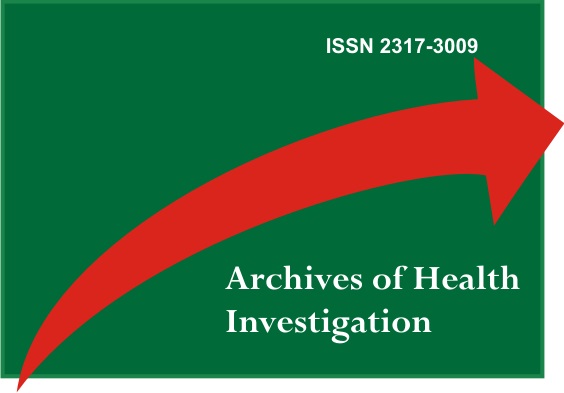Depression, Anxiety, Stress and Sleep Quality in Patients with Eating Disorders
DOI:
https://doi.org/10.21270/archi.v12i1.5822Keywords:
Bulimia Nervosa, Anorexia Nervosa, Depression, Anxiety, Psychological DistressAbstract
Eating disorders are characterized as biopsychosocial disorders in which the individual may have serious physical and psychological complications. The aim of this study was to evaluate the levels of depression, anxiety, stress and sleep quality in patients with anorexia or bulimia nervosa. The sample consisted of 30 women attending a specialized mental health clinic in the state of São Paulo. The instruments used for data collection were the DASS-21 Scale and the Toronto Sleep Assessment Questionnaire. Very severe levels of depression were identified in 53.33% of patients; very severe levels of anxiety by 60%; and very severe levels of stress by 26.67%. There was a significant positive correlation (p<0.05) between the sleep quality assessment scores and the depression, anxiety and stress scales. There was a significant association (p<0.05) between higher levels of stress and a lower number of residents at home. Patients with eating disorders showed severe impairments in their mental health, with high levels of depression, anxiety and stress, correlated with worse sleep quality.
Downloads
References
Bloc LG, Nazareth ACP, Moreira AKSMV. Transtorno de compulsão alimentar: revisão sistemática da literatura. Rev Psicol Saúde. 2019;11(1):3-17.
Lutter M. Emerging treatments in eating disorders. Neurotherapeutics. 2017;14(3):614-22.
Herpertz-Dahlmann B. Adolescent eating disorders: definitions, symptomatology, epidemiology and comorbidity. Child Adolesc Psychiatr Clin N Am. 2009;18(1):31-47.
Brandys MK, de Kovel CG, Kas MJ, van Elburg AA, Adan RA. Overview of genetic research in anorexia nervosa: The past, the present and the future. Int J Eat Disord. 2015;48(7):814-25.
Juli MR. Can violence cause eating disorders? Psychiatr Danub. 2015;27 Suppl 1:S336-8.
Galmiche M, Déchelotte P, Lambert G, Tavolacci MP. Prevalence of eating disorders over the 2000-2018 period: a systematic literature review. Am J Clin Nutr. 2019;109(5):1402-13.
Lima NL, Rosa COB, Rosa JFV. Identificação de fatores de predisposição aos transtornos alimentares: anorexia e bulimia em adolescentes de Belo Horizonte, Minas Gerais. Estud Pesqui Psicol. 2012;12(2):360-78.
American Psychiatric Association. Diagnostic and statistical manual of mental disorders. 5th ed. American Psychiatric Association: Arlington; 2013.
Sharan P, Sundar AS. Eating disorders in women. Indian J Psychiatry. 2015;57(Suppl 2):S286-95.
Schaumberg K, Welch E, Breithaupt L, Hübel C, Baker JH, Munn-Chernoff MA et al. The science behind the academy for eating disorders' nine truths about eating disorders. Eur Eat Disord Rev. 2017;25(6):432-50.
Lovibond PF, Lovibond SH. The structure of negative emotional states: Comparison of the Depression Anxiety Stress Scales (DASS) with the Beck depression and anxiety inventories. Behav Res Ther. 1995;33(3):335-43.
Patias ND, Machado WL, Bandeira DR, Dell'aglio DD. Depression Anxiety and Stress Scale (DASS-21) - Short form: Adaptação e validação para adolescentes brasileiros. Psico-USF. 2016;21(3):459-69.
Cesta A, Moldofsky H, Sammut C. The University of Toronto Sleep Assessment Questionnaire (SAQ). Sleep Res. 1996;25:486.
Santos KMC, Zanotti SV. A anorexia na clínica contemporânea: considerações sobre o sintoma. Estud Pesqui Psicol. 2016;16(spe):1239-55.
Oldershaw A, Hambrook D, Stahl D, Tchanturia K, Treasure J, Schmidt U. The socioemotional processing stream in anorexia nervosa. Neurosci Biobehav Rev. 2011;35(3):970-88.
Solmi M, Collantoni E, Meneguzzo P, Degortes D, Tenconi E, Favaro A. Network analysis of specific psychopathology and psychiatric symptoms in patients with eating disorders. Int J Eat Disord. 2018;51(7):680-92.
Nascimento VS, Santos AV, Arruda SB, Silva GA, Cintra JDS, Pinto TCC, Ximenes RCC. Association between eating disorders, suicide and depressive symptoms in undergraduate students of health-related courses. Einstein (Sao Paulo). 2019;18:eAO4908.
Rania M, Monell E, Sjölander A, Bulik CM. Emotion dysregulation and suicidality in eating disorders. Int J Eat Disord. 2021;54(3):313-25.
Mizusaki K, Gih D, LaRosa C, Richmond R, Rienecke RD. Psychotropic usage by patients presenting to an academic eating disorders program. Eat Weight Disord. 2018;23(6):769-74.
Chiba FY, Moimaz SAS, Garbin AJI, Garbin CAS. Avaliação da procura pelos serviços de saúde e tratamento farmacológico de pacientes com anorexia e bulimia nervosa. Arch Health Invest.2019;8(5):256-61.
Goel NJ, Sadeh-Sharvit S, Trockel M, Flatt RE, Fitzsimmons-Craft EE, Balantekin KN, Monterubio GE, Firebaugh ML, Wilfley DE, Taylor CB. Depression and anxiety mediate the relationship between insomnia and eating disorders in college women. J Am Coll Health. 2021;69(8):976-81.
Allison KC, Spaeth A, Hopkins CM. Sleep and eating disorders. Curr Psychiatry Rep. 2016;18(10):92.
de Matos AP, Rodrigues PRM, Fonseca LB, Ferreira MG, Muraro AP. Prevalence of disordered eating behaviors and associated factors in Brazilian university students. Nutr Health. 2020;9:260106020971136.
Oliveira LL, Hutz CS. Padrões de interação em famílias de adolescentes com anorexia nervosa restritiva e bulímica: semelhanças e diferenças. Estud Pesqui Psicol. 2008;8(3):712-43.
González-Sanguino C, Ausín B, Castellanos MA, Saiz J, López-Gómez A, Ugidos C, Muñoz M. Mental health consequences of the coronavirus 2020 pandemic (COVID-19) in Spain. A longitudinal study. Front Psychiatry. 2020;11:565474.
Lee HS, Dean D, Baxter T, Griffith T, Park S. Deterioration of mental health despite successful control of the COVID-19 pandemic in South Korea. Psychiatry Res. 2021;295:113570.


